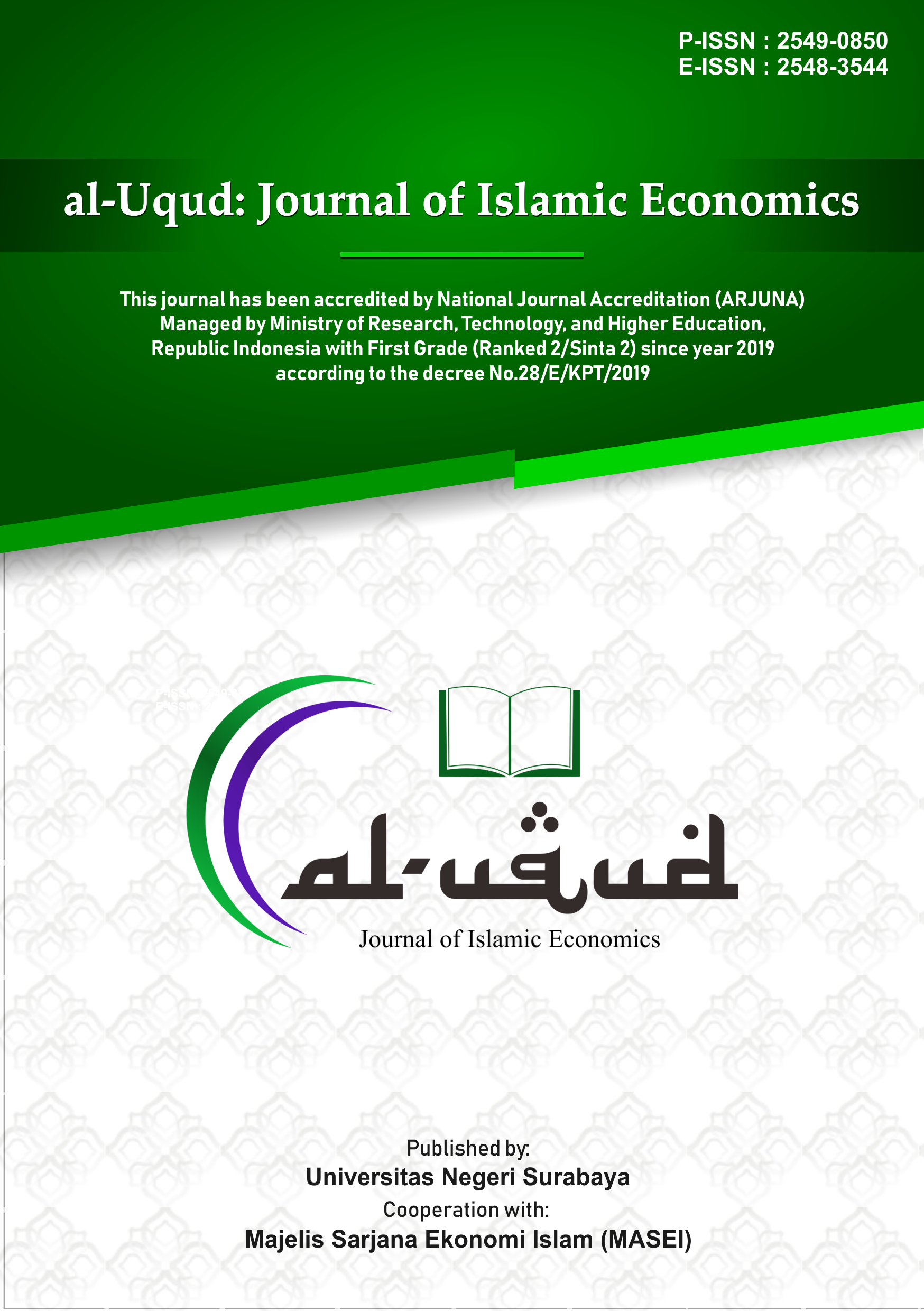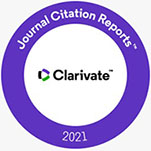Islamic Economic Students Knowledge and Attitude Toward Halal Pharmacy Product in East Java, Indonesia
DOI:
https://doi.org/10.26740/al-uqud.v5n1.p1-15Keywords:
Halal certification, Halal medicine, Customer knowledge, AttitudeAbstract
A Muslim has a limitation in consuming or wearing something. A Muslim is only permitted to consume something halal, either in food, drink, clothes, even finance. In the pharmaceutical industry, the standard of Halal Pharmaceutical is the most crucial document that should be followed to standardize the quality and the safety of halal. This research will analyze the knowledge and attitude of Islamic economics students who have the basic knowledge about halal and analyze how their attitude to the halal pharmacy. The research method is qualitative, with a literature review and descriptive analysis data from the questioner. Information on the label will influence the choices before buying and or consuming the medicine on the customer site. Consumers prefer to choose medicine with a halal label so that it will also benefit industries that have halal labels. But, in halal pharmacy, customers still hard to applied halal things in medicine; even though customers understand about halal, customers' attitude does not imply the principle of halal in the medicine.
References
Al-Qaradawi, Y. (2007). The Lawful and Prohibited in Islam. Al-Falah Foundation.
Aminuddin, M. Z. (2017). Sertifikasi Produk Halal: Studi Perbandingan Indonesia dan Thailand. SHAHIH¯: Journal of Islamicate Multidisciplinary, 1(1), 27. https://doi.org/10.22515/shahih.v1i1.52
Anwar, M. K., Fahrullah, A., & Ridlwan, A. A. (2018). The Problems of Halal Certification for Food Industry in Indonesia. International Journal of Civil Engineering and Technology (IJCIET), 9(8), pp. 1625-1632. https://www.iaeme.com/MasterAdmin/uploadfolder/IJCIET_09_08_162/IJCIET_09_08_162.pdf
Aziz, Noorizan Abdul, Majdina, H., Hassan, Y., Zulkifly, H. H., Wahab, M. S. A., Aziz, M. S. A., Yahaya, N., & Razzaq, H. A. A. (2014). Assessment of the Halal Status of Respiratory Pharmaceutical Products in a Hospital. Procedia - Social and Behavioral Sciences, 121(September 2012), 158165. https://doi.org/10.1016/j.sbspro.2014.01.1117
Aziz, Norazlina Abdul, Ibrahim, I., & Raof, N. A. (2014). The Need for Legal Intervention within the Halal Pharmaceutical Industry. Procedia - Social and Behavioral Sciences, 121(September 2012), 124132. https://doi.org/10.1016/j.sbspro.2014.01.1114
Basari, H. (2019). New Frontiers in Halal Pharmaceuticals. International Journal of Research in Pharmaceutical Sciences, 10(SPL1). https://doi.org/10.26452/ijrps.v10iSPL1.1687
Boddy, C. R. (2016). Sample size for qualitative research. Qualitative Market Research: An International Journal, 19(4), 426432. https://doi.org/http://dx.doi.org/10.1108/QMR-06-2016-0053
Bonett, D. G. (2002). Sample Size Requirements for Testing and Estimating Coefficient Alpha. Journal of Educational and Behavioral Statistics, 27(4), 335340. https://doi.org/10.3102/10769986027004335
Creswell, J. W., & Creswell, J. D. (2017). Research designs: Qualitative, quantitative, and mixed methods approaches. Sage Publications.
Daher, M., Chaar, B., & Saini, B. (2015). Impact of patients religious and spiritual beliefs in pharmacy: From the perspective of the pharmacist. Research in Social and Administrative Pharmacy, 11(1), 31-41. https://doi.org/10.1016/j.sapharm.2014.05.004
Department of Islamic Development Malaysia. (2005). Manual procedure of halal certification Malaysia. Department of Islamic Development Malaysia Kuala Lumpur.
Eliasi, J. R., & Dwyer, J. T. (2002). Kosher and Halal: religious observances affecting dietary intakes. Journal of the Academy of Nutrition and Dietetics, 102(7), 911. https://doi.org/10.1016/S0002-8223(02)90203-8
Ellen, S. (2012). Slovins formula sampling techniques. Dryden Press.
Fischer, J. (2008). Religion, science and markets. EMBO Reports, 9(9), 828-831. https://doi.org/10.1038/embor.2008.156
Hakim, A. L. (2015). Dissecting The Contents of Law of Indonesia on Halal Product Assurance. Indonesia Law Review, 5(1), 88103. https://doi.org/10.15742/ilrev.v5n1.135
Halim, M. A. A., Salleh, M. M. M., Kashim, M., Ahmad, A. A., Nordin, N., & Others. (2014). Halal pharmaceuticals: legal, shariah issues and fatwa of drug, gelatine and alcohol. International Journal of Asian Social Science, 4(12), 1176--1190. https://doi.org/10.18488/journal.1
Hoesli, T. M., Smith, K. M., & Others. (2011). Effects of religious and personal beliefs on medication regimen design. Orthopedics, 34(4), 292295. https://doi.org/10.3928/01477447-20110228-17
Husni, P., Putriana, N. A., & Wicaksono, I. A. (2017). Metode Deteksi Kandungan Babi dan Alkohol dalam Eksipien Farmasi dan Produk Obat untuk Menjamin Kehalalan Sediaan Obat. Majalah Farmasetika, 2(1), 17. https://doi.org/10.24198/farmasetika.v2i1.12653
Hussein, A. (2009). The use of triangulation in social sciences research: Can qualitative and quantitative methods be combined. Journal of Comparative Social Work, 1(8), 112. https://doi.org/10.31265/jcsw.v4i1.48
Kawaguchi-Suzuki, M., Hogue, M. D., Khanfar, N. M., Lahoz, M. R., Law, M. G., Parekh, J., Zairina, E., Hong, J., Robles, Y. R., & Van Thang, V. (2019). Cultural Sensitivity and Global Pharmacy Engagement in Asia: India, Indonesia, Malaysia, Philippines, and Vietnam. American Journal of Pharmaceutical Education, 83(4). https://doi.org/10.5688/ajpe7215
Kordnaeij, A., Askaripoor, H., & Bakhshizadeh, A. (2013). Studying affecting factors on customers attitude toward products with halal brand (case study: Kuala Lumpur Malaysia). International Research Journal of Applied and Basic Sciences, 4(10), 3138--3145. http://www.irjabs.com/files_site/paperlist/r_1117_130816235418.pdf
Krasniqi, M., & Krasniqi, D. (2014). Attitudes and Costumer Behaviour. European Journal of Social Science Education and Research, 1(2), 98--104. https://doi.org/10.26417/ejser.v2i1.p98-104
Lada, S., Tanakinjal, G. H., & Amin, H. (2009). Predicting intention to choose halal products using theory of reasoned action. International Journal of Islamic and Middle Eastern Finance and Management, 2(1), 6676. https://doi.org/10.1108/17538390910946276
Lee, Y. K., Low, W. Y., & Ng, C. J. (2013). Exploring patient values in medical decision making: a qualitative study. PloS One, 8(11). https://doi.org/10.1371/journal.pone.0080051
Maison, D., Marchlewska, M., Syarifah, D., Zein, R. A., & Purba, H. P. (2018). Explicit Versus Implicit œHalal Information: Influence of the Halal Label and the Country-of-Origin Information on Product Perceptions in Indonesia. Frontiers in Psychology, 9, 382. https://doi.org/10.3389/fpsyg.2018.00382
Maulidia, R. (2013). Urgensi Regulasi Dan Edukasi Produk Halal Bagi Konsumen. Justicia Islamica, 10(2), 359390. https://doi.org/10.21154/justicia.v10i2.153
Mohezar, S., Zailani, S., & Tieman, M. (2016). Tapping into the halal pharmaceutical market: issues and challenges. In Contemporary Issues and Development in the Global Halal Industry. In Contemporary Issues and Development in the Global Halal Industry (pp. 531--541). Springer. https://doi.org/10.1007/978-981-10-1452-9_48
Padela, A. I., Gunter, K., Killawi, A., & Heisler, M. (2012). Religious values and healthcare accommodations: voices from the American Muslim community. Journal of General Internal Medicine, 27(6), 708--715. https://doi.org/10.1007/s11606-011-1965-5
Pathak, V., Jena, B., & Kalra, S. (2013). Qualitative research. Perspectives in Clinical Research, 4(3). https://doi.org/10.4103/2229-3485.115389
Prabowo, A., Wirjodirdjo, B., & Vanany, I. (2012). Analisis Kebijakan Penggunaan Obat Generik di Indonesia serta Dampaknya pada Biaya Belanja Obat Masyarakat ( Studi Kasus pada Obat Penyakit Diabetes Menggunakan Pendekatan Sistem Dinamik). Jurnal Teknik ITS, 1(1), 592594. https://doi.org/10.12962/j23373539.v1i1.2152
Pujari, N. M., Sachan, A. K., Kumari, P., & Dubey, P. (2016). Study of Consumers Pharmaceutical Buying Behavior Towards Prescription and Non-Prescription Drugs. Journal of Medical and Health Research, 2016(01), 30. http://epixpub.com/jmhr/index.php
Purnamasari, T. I., Hawin, M., & Anshori, A. G. (2015). Pengaturan Bentuk-bentuk Perlindungan Konsumen dalam Penyelenggaraan Jaminan Produk Halal Dan Tayib Di Indonesia. Universitas Gadjah Mada.
Rajagopal, S., Ramanan, S., Visvanathan, R., & Satapathy, S. (2011). Halal certification: implication for marketers in UAE. Journal of Islamic Marketing, 2(2), 138153. https://doi.org/10.1108/17590831111139857
Regenstein, J. M., Chaudry, M. M., & Regenstein, C. E. (2003). The kosher and halal food laws. Comprehensive Reviews in Food Science and Food Safety, 2(3), 111--127. https://doi.org/10.1111/j.1541-4337.2003.tb00018.x
Sadeeqa, S. (2014). Assessment of KAP Among Hospital Pharmacists. Value in Health, 17(7), A754. https://doi.org/10.1016/j.jval.2014.08.219
Sadeeqa, S., Sarrif, A., Masood, I., Saleem, F., & Atif, M. (2014). Knowledge, Attitude and Perception (KAP) Regarding Halal Pharmaceuticals among General Public in Penang State of Malaysia. International Journal of Public Health Science (IJPHS), 2(4). https://doi.org/10.11591/ijphs.v2i4.4226
Sadeeqa, S., Sarriff, A., Masood, I., Atif, M., & Farooqi, M. (2013). Evaluation of knowledge, attitude, and perception regarding Halal pharmaceuticals, among general medical practitioners in Malaysia. Archives of Pharmacy Practice, 4(4), 139. https://doi.org/10.4103/2045-080X.123209
Sadeeqa, S., Sarriff, A., Masood, I., & Farooqui, M. (2013). Knowledge, attitude and perception regarding halal Pharmaceuticals among academicians in various universities of Malaysia. International Journal of Educational Research and Development, 2(8), 191202. https://www.researchgate.net/profile/Imran_Masood/publication/259106465_Knowledge_attitude_and_perception_regarding_Halal_Pharmaceuticals_among_academicians_in_various_universities_of_Malaysia/links/550968ce0cf26ff55f856d48.pdf
Soesilowati, E. S. (2010). Business opportunities for halal products in the global market: Muslim consumer behaviour and halal food consumption. Journal of Indonesian Social Sciences and Humanities, 3, 151160. https://doi.org/10.14203/jissh.v3i1.50
Tejada, J. J., & Punzalan, J. R. B. (2012). On the misuse of Slovins formula. The Philippine Statistician, 61(1), 129136.
Vahdati, H., Mousavi, N., Tajik, Z. M., & Others. (2015). The study of consumer perception on corporate social responsibility towards consumers attitude and purchase behavior. Asian Economic and Financial Review, 5(5), 831--845. https://doi.org/10.18488/journal.aefr/2015.5.5/102.5.831.845
Wilson, J. A., & Liu, J. (2011). The challenges of Islamic branding: navigating emotions and halal. Journal of Islamic Marketing, 2(1), 2842. https://doi.org/10.1108/17590831111115222
Downloads
Published
How to Cite
Issue
Section
License
CC BY 4.0 Abstract views: 1637
,
Abstract views: 1637
, PDF Downloads: 1517
PDF Downloads: 1517








